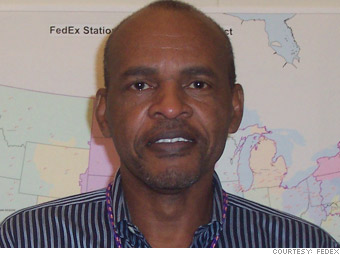
Company: FedEx
Employee: Melvin Bradley
Job: Manager, FedEx Express Weather Services
FedEx guarantees fast service no matter what -- but, unfortunately, the weather doesn't always cooperate. That's why the company has its own team to predict the weather.
FedEx meteorologists monitor 697 planes at over 150 of the company's 300 airports. The meteorologists have to provide an accurate report within a five-mile radius of any given airport, says meteorology team chief Melvin Bradley. "The New York TV weather guy may say 'chance of showers.' We're not privileged enough to do that -- everything has to be a lot more precise."
Bradley is no stranger to military-style precision -- he worked for the Air Force for 20 years before starting at FedEx 19 years ago. "I've seen a lot," he says, "but in weather, you will never see everything."
The most difficult daily challenge for Bradley's team isn't predicting major storms -- it's fog. FedEx and other carriers fly cargo, not commercial, planes. "The cargo airlines pretty much rule the sky at night," Bradley says. That means that he and his team spend much of their time predicting early morning visibility conditions. If the meteorologists identify a potential problem, they try to notify customers before a shipment ever leaves the ground. "If we don't, there's a chance that those packages on that airplane may miss service, and that goes against everything FedEx stands for."
Employee: Melvin Bradley
Job: Manager, FedEx Express Weather Services
FedEx guarantees fast service no matter what -- but, unfortunately, the weather doesn't always cooperate. That's why the company has its own team to predict the weather.
FedEx meteorologists monitor 697 planes at over 150 of the company's 300 airports. The meteorologists have to provide an accurate report within a five-mile radius of any given airport, says meteorology team chief Melvin Bradley. "The New York TV weather guy may say 'chance of showers.' We're not privileged enough to do that -- everything has to be a lot more precise."
Bradley is no stranger to military-style precision -- he worked for the Air Force for 20 years before starting at FedEx 19 years ago. "I've seen a lot," he says, "but in weather, you will never see everything."
The most difficult daily challenge for Bradley's team isn't predicting major storms -- it's fog. FedEx and other carriers fly cargo, not commercial, planes. "The cargo airlines pretty much rule the sky at night," Bradley says. That means that he and his team spend much of their time predicting early morning visibility conditions. If the meteorologists identify a potential problem, they try to notify customers before a shipment ever leaves the ground. "If we don't, there's a chance that those packages on that airplane may miss service, and that goes against everything FedEx stands for."
NEXT: Innovation matchmaker
Last updated May 18 2011: 8:41 AM ET
